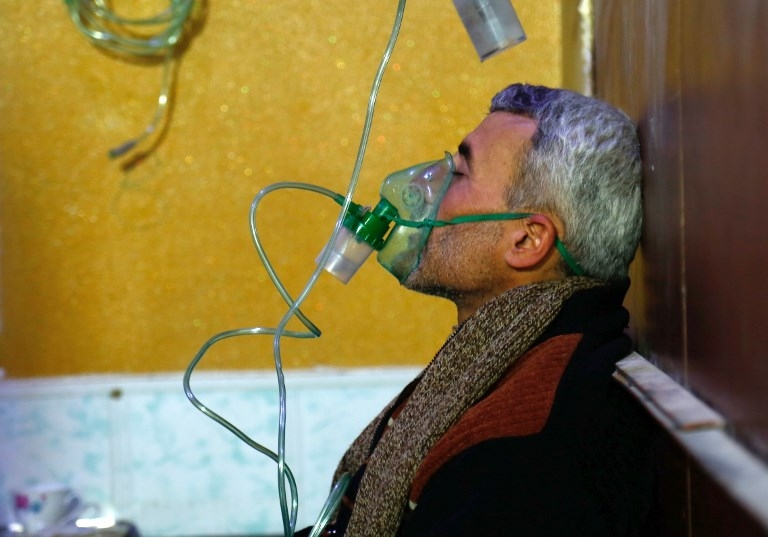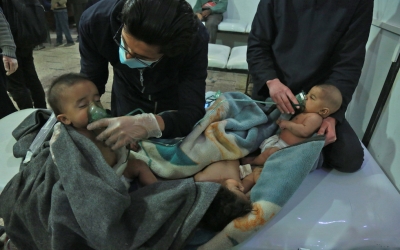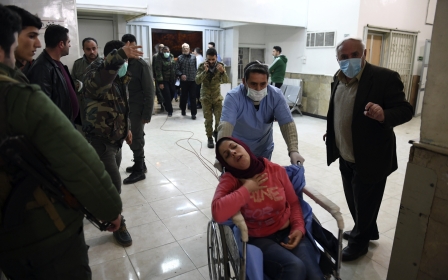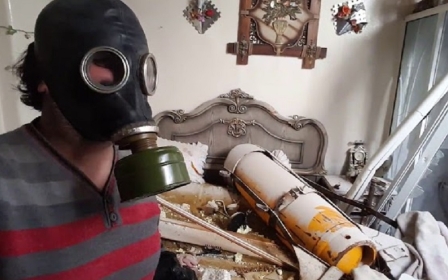Human rights groups press Germany to investigate sarin gas attacks in Syria

Human rights groups submitted a criminal complaint to the German courts on Monday to demand justice for victims of chemical weapons attacks perpetrated by Syrian President Bashar al-Assad's forces.
The Syrian Centre for Media and Freedom of Expression (SCM) and the Syrian Archive called on the German attorney-general to investigate the 2013 sarin gas attack in Eastern Ghouta and the 2017 chemical attack in Khan Sheikhoun.
The complaint includes a two-year-long investigation that details how Syrian government officials were responsible for the attacks. Both chemical attacks marked some of the worst episodes of the Syrian civil war and killed at least 1,500 people, including many children.
Testimonies from survivors of both chemical attacks, now living in Germany; documents provided by former government insiders and the United Nations also implicate officials and reveal the chain of command that ordered the attacks.
The complaint aims for the arrest and prosecution of officials they held responsible.
New MEE newsletter: Jerusalem Dispatch
Sign up to get the latest insights and analysis on Israel-Palestine, alongside Turkey Unpacked and other MEE newsletters
Germany is one of the few countries in the world that have extraterritorial jurisdiction over war crimes, crimes against humanity and genocide.
The decision to take war crime allegations to the German courts came after several attempts to take the case to the International Criminal Court were thwarted by Assad's allies Russia and China at the United Nations.
But if Berlin agrees to take on the criminal complaint, it would be unlikely that a case can be launched against Syrian officials unless they come to Germany, as the country does not try people in absentia.
“International cooperation will be the key to successful efforts to hold the perpetrators accountable,” said Steve Kostas, a senior legal officer at the Open Society Justice Initiative.
“States with evidence on Syria’s chemical weapons programme and chemical attacks should provide that information to states with the jurisdiction to investigate and prosecute the Syrian commanders and officials responsible.”
Mazen Darwish, director of SCM, said in a statement that the decision to go to the German courts was done to prevent officials from avoiding justice in any future peace deal.
“We are afraid that if we go to a political agreement without justice and accountability, this means that we will return our country to a second round of war,” Darwish told the Associated Press. “And this time, we will have a new war built on revenge.”
Chemical weapons have been used throughout the Syrian civil war by Syria's government in a deliberate campaign against civilian populations in rebel-held areas. The Syrian government and its allies have denied using chemical weapons.
In July, the Organisation for the Prohibition of Chemical Weapons (OPCW) condemned the government's use of chlorine and sarin against a civilian population.
The OPCW accused the Syrian government of storing a covert supply of sarin gas - a charge Damascus continues to deny.
Middle East Eye delivers independent and unrivalled coverage and analysis of the Middle East, North Africa and beyond. To learn more about republishing this content and the associated fees, please fill out this form. More about MEE can be found here.





